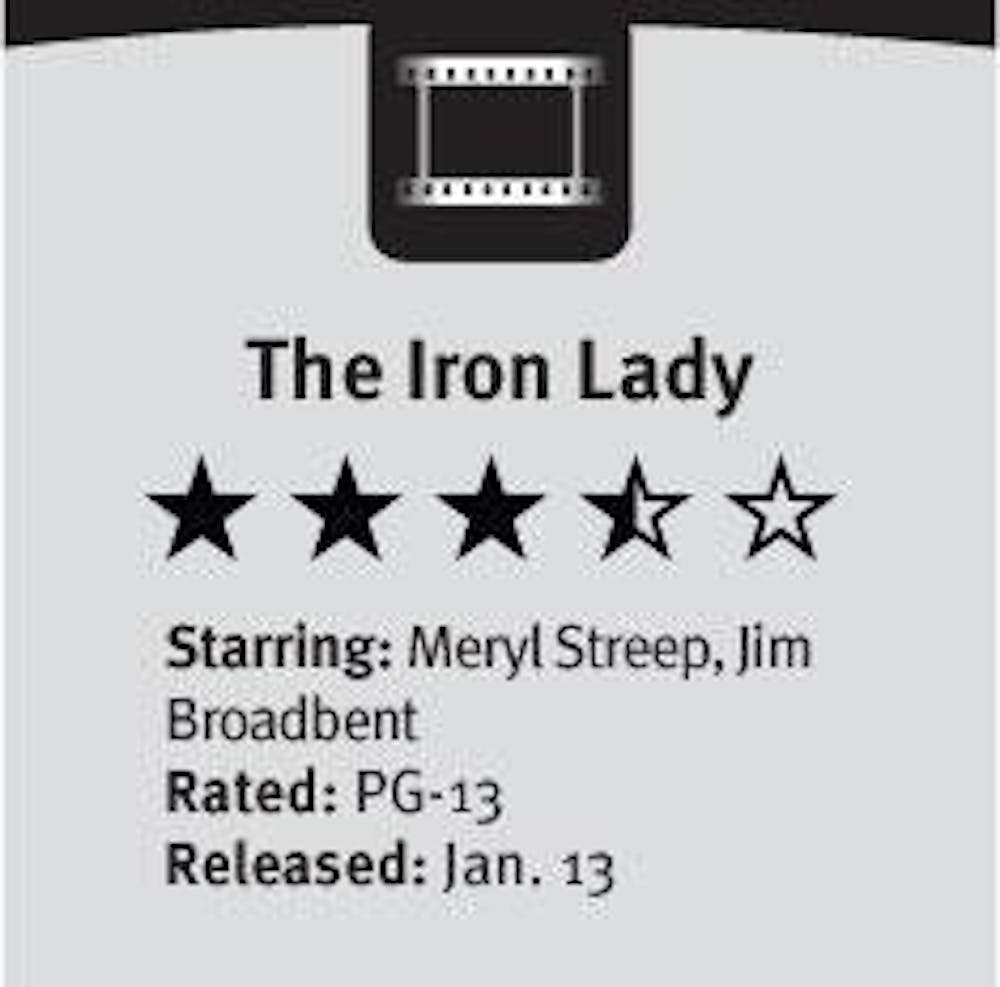"Iron Lady" not so unyielding after all

Margaret Thatcher is still alive? Yes, she is indeed. Apparently she's doddering through the streets of London in search of well-priced milk to serve her nine-years-dead husband for ?morning tea.
In the decades after her infamous 1990 ousting as leader of the Conservative Party and 11-year stint as prime minister, Margaret Thatcher has rung synonymous with obstinate hard-line conservatism. She was the U.K.'s first (and so far only) female prime minister and ran the government from ?10 Downing Street with a steely eye, softened slightly only by a double strand of pearls and a neat layer ?of lipstick.
That's where director Phyllida Lloyd (Mamma Mia!) steps in with The Iron Lady. This film reveals to audiences the story of a grocer's headstrong daughter who gained a place at Oxford University, fought her way to Parliament in 1959 and finally to Prime Ministership, beginning in 1979. Lloyd crafts a bittersweet film, highlighting the flaws of Thatcher, from her unwillingess to concede to the damages done to her children in her constant absence.
If one is looking for a critical biopic, though, this is perhaps not the greatest choice. This keeps the film from tedium, though a younger generation may be left wondering what, indeed, was the Falklands War? And why are British people always fighting over unions in their films? (I think here of Billy Elliot, a contemporary classic.) Additionally, though Rice University students may be aware of the exploding tensions between Ireland, Northern Ireland and Britain but some may wonder why a retirement account would try to assassinate the Boss Lady in the 1984 "Brighton Attack," since the IRA stands for the Irish Republican Army.
Additionally, an exploration of the marriage between Denis and Margaret Thatcher leaves most questions unanswered. Though the actors spar nicely enough with each other, the deep emotions and connections are lacking, as is an explanation of what, exactly, Denis did for all of Thatcher's political career — stay-at-home dad?
The emphasis of royal blue as Thatcher's favorite color is not lost. The camera angle often makes the viewers feel like they are being harangued or entreated by the actors on the stage or doing the haranguing as actors themselves, a clever trick appropriate to the subject matter. The Thomas Newman soundtrack is nuanced and well-paced, underscoring the decline of the once all-powerful Thatcher.
The casting choices of the film are sublime. Meryl Streep, as reigning empress of actresses, gives a tour de force performance as the lady in her prime and as the frail, vulnerable woman of now, whose lipstick has faded to reveal the wrinkled pale lip underneath. (This is truly heartbreaking imagery, folks.) Streep, who has received Oscar nominations in The Deer Hunter, The Devil Wears Prada, and Julie & Julia, rises to her latest challenge completely, right down to the lower middle class-tinged accent that caused one Parliament member to criticize, "The lady doth screech too much."
Young Margaret, with her ardent blue eyes on the Parliament prize, is wonderfully played by Alexandra Roach in her first major film role.
However, it is the two actors who play Denis Thatcher, Margaret's husband of over 50 years, who truly steal the show. Jim Broadbent is the eponymous English character actor and. here, he delivers a formidable performance as he haunts Margaret around their quiet home nearly 10 years after his death. At times hellishly obnoxious, at others tender and obedient, Broadbent traverses what could be stock "kept husband" terrain with a roguish wit that keeps Denis sparking and undaunted by his wife. Harry Lloyd (Game of Thrones) as young Denis is no less a charming whippersnapper in his courtship of the awkward young Margaret. He steals every scene in which he appears, from their first encounter at a formal dinner to a ballot box loss and proposal.
What is most haunting about the film is its portrait of an aging icon, its tender revelation of the thousand vulnerabilities that come with aging. It is the increasingly uncertain footsteps and chats with a dead husband that absolutely make this film worth watching. For, as John Donne said, "Death comes equally to us all, and makes us all equal when it comes." We go on, business as usual, even as our bodies fail and our minds wander.
More from The Rice Thresher

Over 1,000 students petition against new meal plan
When Konstantin Savvon opened the Housing and Dining email announcing the new unlimited meal plan, he was instantly concerned about the impact on off-campus students like himself.

Rice football wins season opener under new coach
For the first time since 2018, Rice football opened its season with a victory. Scott Abell was soaked with yellow Powerade following a 14-12 win on the road Saturday against the University of Louisiana at Lafayette, which won 10 games and made it to the Sun Belt Conference championship last season.

Acting like an athlete: Rice basketball alum takes on Broadway
Underneath Chadd Alexander’s Broadway costume, there’s ankle tape and wrist braces — same protective gear he wore as a walk-on basketball player at Rice, though now he’s performing eight shows a week in the ensemble of “Harry Potter and the Cursed Child” instead of running conditioning drills in Tudor Fieldhouse.

Please note All comments are eligible for publication by The Rice Thresher.